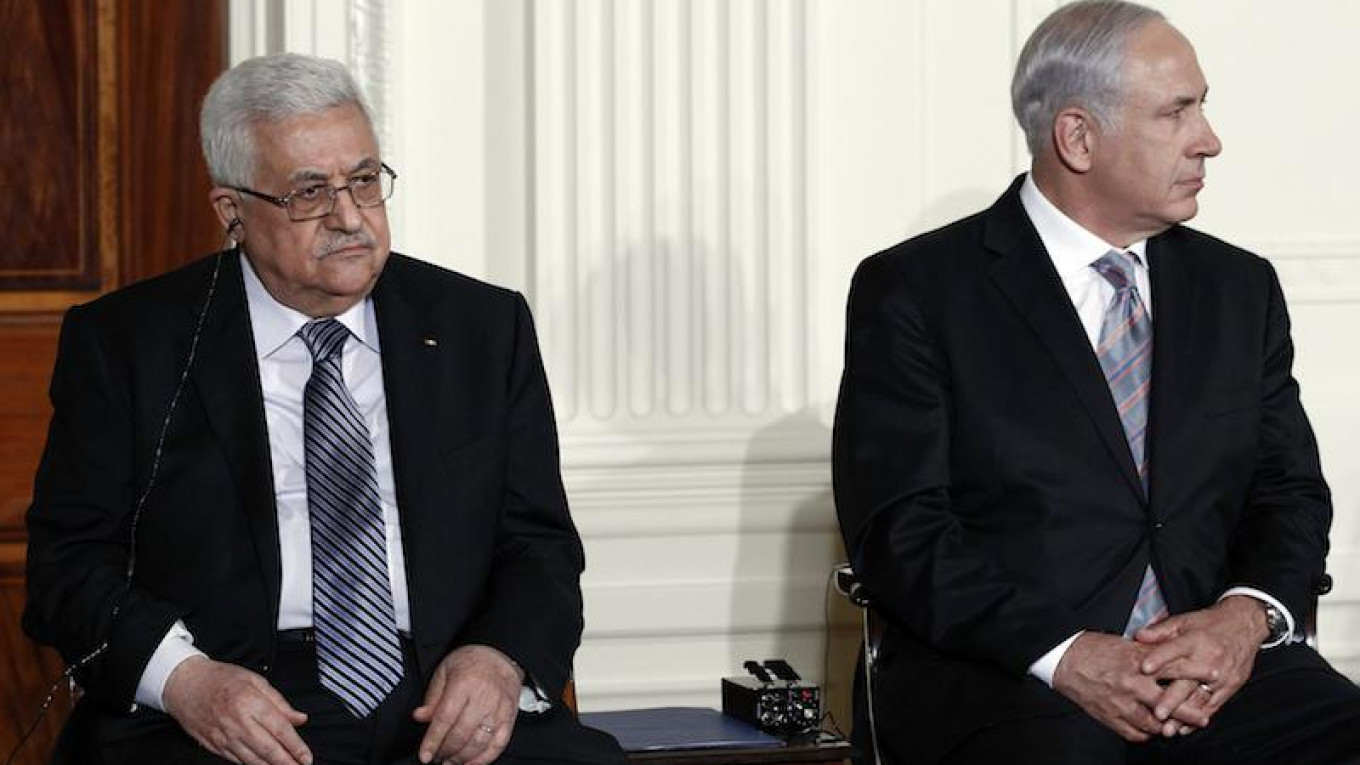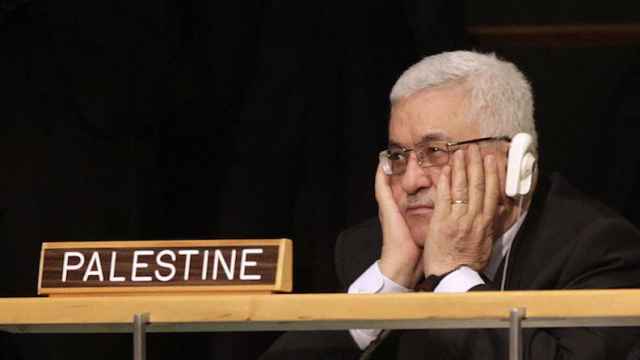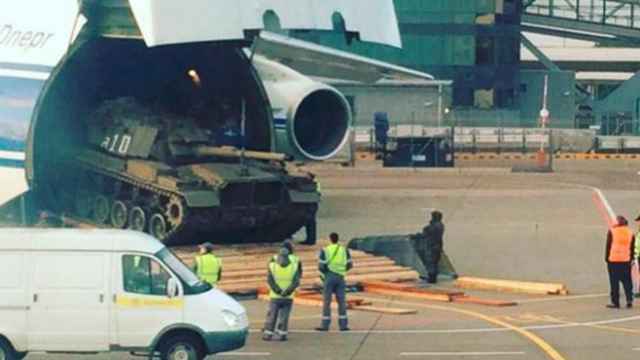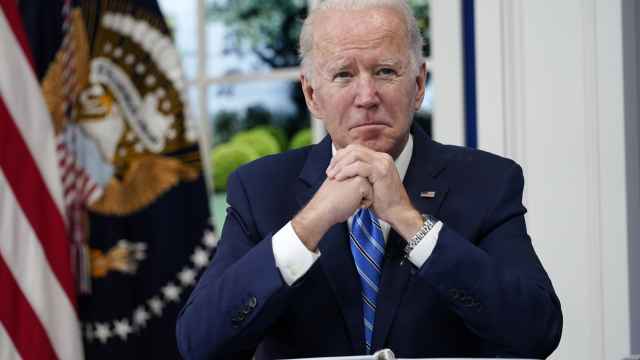Part of asserting yourself as a great power is doing the things great powers do. And it is this line of thinking that informs much of Moscow’s foreign policy. In recent years, President Vladimir Putin has taken to throwing his weight around the neighborhood, deploying expeditionary forces to far-off conflicts, and chest-beating before the United Nations — just like the leader of a great power.
It was only a matter of time, then, before Moscow flirted with another great power classic: Trying to solve the infamously intractable Israeli-Palestinian conflict. And Moscow’s entrance to the peacemaking scene in the Middle East has so far followed a simple, familiar rubric: Gloat over U.S. failure in a region, and courageously step up to assume the burden.
“After the failure of U.S. mediation efforts in 2013-14,” dialogue between the two sides must resume, Russian Foreign Ministry spokesperson Maria Zakharova said at a press conference on Sept. 8. Those U.S.-led talks broke down when a negotiation deadline was reached, and neither side could agree on the boundaries of a future two-state solution and framework for peaceful coexistence.
Capping off a week in which both the Israelis and Palestinians intimated support for Russia-brokered talks, Zakharova boasted on Sept. 8 that the two sides had agreed in principle to meet in Russia. Moscow’s efforts are now focused on the timing of a meeting, and “intensive contacts to this effect continue.”
So far, no further details have been made public, and experts doubt that Moscow has any substantial agenda in mind.
Easier Said Than Done
Even with the bar set so low, Moscow may quickly find the Israel-Palestine affair to be a difficult one to manage, and that the conflict operates by its own logic of mutual loathing and bad blood. Many have tried and failed to facilitate peace in the region, and Putin will have to somehow overcome the suspicion that dominates Israeli-Palestinian relations.
The first hiccup came relatively quickly, on Sept. 7. Two Israeli researchers in Jerusalem unveiled evidence that Palestinian President Mahmoud Abbas was at one time on the KGB’s payroll, throwing into question the nature of his current relationship with Putin, who was himself a KGB officer through the end of the Soviet era.
“We thought it was important now in the context of the Russian attempt to arrange a summit,” one of the researchers, Gideon Remez, said to The New York Times. His colleague, Isabella Ginor, says it is unclear how the relationship later developed, and if it continues to this day. “But now that he is head of the Palestinian Authority, this can be a lever on him.”
Ironically, this lever — if it exists — could serve Israel’s interests. In response to Russia’s proposed meeting in Moscow, Israeli Prime Minister Benjamin Netanyahu’s office said he would be happy to meet with Abbas, if the Palestinian leader drops his requirement that any talks be preceded by a halt to Israeli settlement of the West Bank and a release of prisoners in Israeli captivity.
There has yet to be any public indication that Abbas will drop those demands, but “if a certain degree of trust exists between Abbas and Moscow, and Abbas has significant interest in at least reaching an interim solution, then the Palestinian side might be pretty easy to handle,” says Mikhail Troitskiy, a professor at the Moscow State Institute of International Relations, or MGIMO. He adds, however, that he doubts Abbas is an active Kremlin agent.
The documents cited by Israeli scholars date back to 1983, when Abbas was based in the Syrian capital of Damascus, working as a liaison for the Palestinian Liberation Organization. The Soviets were supplying the PLO with weapons for their fight against the Israelis.
“Abbas was certainly a KGB source, but that was a long time ago and I do not think it matters much now,” says Vladimir Frolov, a Russian international affairs expert. “There is certainly no current dependency for Abbas on Russia.”
However, the Palestinian leader has made nearly annual visits to Moscow since rising to power a decade ago. It is also noteworthy that the Russian official spearheading efforts to draw Abbas and Netanyahu to Moscow is Deputy Foreign Minister Mikhail Bogdanov, who was stationed at the Russian Embassy in Damascus twice during the period from 1983 to 1994, overlapping with Abbas’ time there.
While Moscow could, perhaps, lean on Abbas to drop his usual preconditions to get the ball rolling, the hard realities of the Palestinian leader’s political circumstances limit the Kremlin’s power here. Abbas’ position as Palestine’s president is tenuous and uncertain, Troitskiy argues. While he may need to demonstrate moves toward peace, he can’t be seen to capitulate.
Filling the Void
Regardless of the nature of Moscow’s relationship with Abbas, the Russians are unlikely to produce any groundbreaking agenda to drive a renewed peace effort. The Kremlin’s motivations, moreover, are rather self-centered, and Moscow seems interested merely in demonstrating resolve where the United States has shown little. Talks led by U.S. Secretary of State John Kerry collapsed in 2014, and so have similar French-led efforts.
Officially, the United States blamed both sides in the Middle East for the collapse of peace talks, but the White House has implied that Israel proved overly difficult to work with in pursuing the so-called two-state political settlement: a peace built on the establishment of a Palestinian state, and agreement that both Israel and Palestine will tolerate the others’ existence. How Russia plans to pursue this differently remains to be seen.
“Substantively, I don’t think Moscow has a new settlement plan or is counting on much progress during talks,” says Frolov. “This is all about prestige and status, and to make the point that Russia is back in the Middle East as a player of equal footing to the United States. It’s also a message of humiliation directed at Washington: We can snub you wherever we like.”
The falling out between Netanyahu and U.S. President Barack Obama, who has been less instinctively devoted to Israel than past American leaders, has only made the situation more ripe for Putin’s unique brand of geopolitical opportunism. The Israelis may be weary enough of the West’s failure to kick-start the peace process to allow Moscow to take a stab at mediating new negotiations.
Putin can work with this. In bringing the two sides to Moscow, “Russia is just trying to launch a process and have it tagged as ‘The Moscow Process,’ and be seen as a capital where one of the world’s most long-standing intractable conflicts is being solved,” Troitskiy says. For Putin, this small feat would be a major success. For Israelis and Palestinians, however, it’s unlikely to bring peace.
A Message from The Moscow Times:
Dear readers,
We are facing unprecedented challenges. Russia's Prosecutor General's Office has designated The Moscow Times as an "undesirable" organization, criminalizing our work and putting our staff at risk of prosecution. This follows our earlier unjust labeling as a "foreign agent."
These actions are direct attempts to silence independent journalism in Russia. The authorities claim our work "discredits the decisions of the Russian leadership." We see things differently: we strive to provide accurate, unbiased reporting on Russia.
We, the journalists of The Moscow Times, refuse to be silenced. But to continue our work, we need your help.
Your support, no matter how small, makes a world of difference. If you can, please support us monthly starting from just $2. It's quick to set up, and every contribution makes a significant impact.
By supporting The Moscow Times, you're defending open, independent journalism in the face of repression. Thank you for standing with us.
Remind me later.






